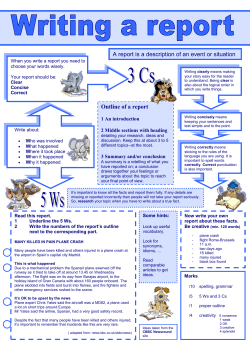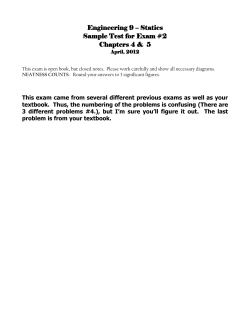
University of Toronto Mississauga Instructor: Ester Dalvit Department of Mathematics TA: Jennifer Vaughan
University of Toronto Mississauga
Instructor: Ester Dalvit
Department of Mathematics
TA: Jennifer Vaughan
Classical geometries - MAT402
Problem set 7 - Due November 11, 2014
You are encouraged to work in groups to solve the homework problems. If you do, please
indicate on your solutions who you worked with and if you used any sources. Write up your
final solutions on your own.
Exercise 1. a) For the following linear fractional transformations of R P1 find the image and pre-image of
∞.
1) f (x) =
1
x+5
2) f (x) =
2x+1
x−1
1
b) Is there a linear fractional transformation of R P mapping the points (given in homogeneous coordinates)
A = [1 : 0] to A0 = [1 : 2], B = [1 : 1] to B 0 = [1 : −1] and C = [1 : 2] to C 0 = [1 : −2]? Explain why and
find one. What if B 0 = [0 : 1] and all the rest is the same?
Exercise 2. Do linear fractional transformations of R P1 form a group? Prove it. Hint: exercises of section
5.6 can be of help.
Exercise 3. Exercises 5.7.1-2-3 from textbook.
Exercise 4 - Optional, not marked. a) Exercises 5.8.1 to 5.8.6 of textbook.
b) Show that the cross-ratio group mentioned there is indeed a group.
Exercise 5. Not all projective geometries arise from vector spaces, not all of them have coordinates! An
example is the Moulton plane. Do exercises 6.1.1 to 6.1.5 from textbook.
Bonus. a) Homogeneous coordinates can be given to define the 7 points of the Fano plane, read Stillwell
page 114-115 for an explanation. Each point has coordinates [x0 : x1 : x2 ] where xi ∈ {0, 1} and xj 6= 0 for
some j. A line of the Fano plane contains exactly 3 points. Given two out of the three points on a line,
explain how to determine the third one.
b) What space do you get with the following definition?
• “points” are the lines of Fano’s plane
• “lines” are the points of Fano’s plane and
• [a “point” is contained in a “line”] if and only if [the Fano point corresponding to the “line” is
contained in the Fano line corresponding to the “point”]
Hint: you can use the incidence matrix for the Fano plane. It shows the relations between points and lines:
each row corresponds to a line and each column to a point. The entry aij is 1 if point j lies on line i,
otherwise it is 0.
© Copyright 2025















